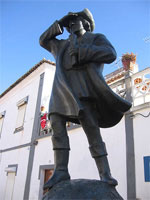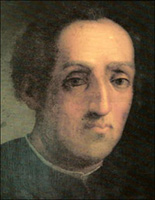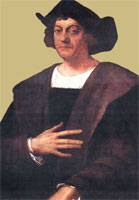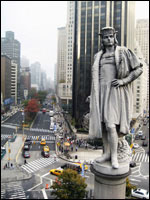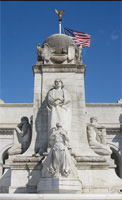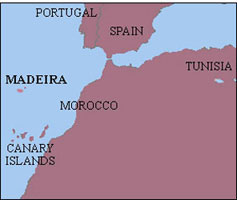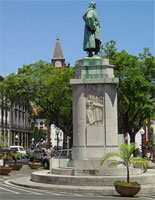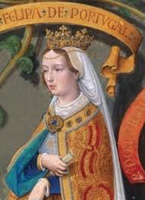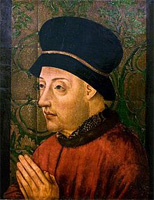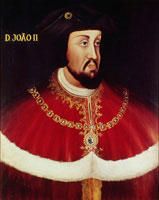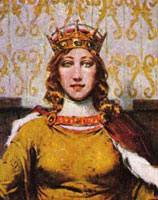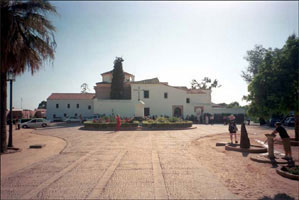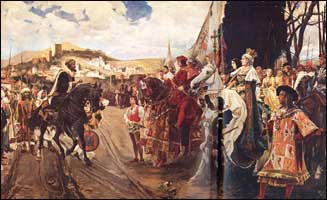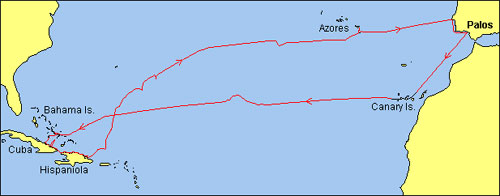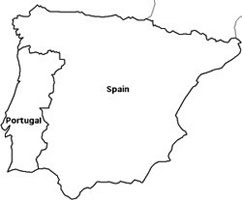| . | WHEN PORTUGUESE COLUMBUS LANDED IN CUBA, HE CALLED THE NATIVES "INDIANS,"
BECAUSE POPE CALIXTUS III DONATED INDIA TO PORTUGAL IN 1456. |
Here is a quote on the Papal donation of India to Portugal:
King Alfonso V was concerned that Spanish ships might sail past the region of current Portuguese activity in Africa and claim land further south along the coast. He appealed to the pope again the following year, and on March 13, 1456, the new pope, Calixtus III, issued a bull clarifying Portugal's right of exclusivity as extending "as far as and through all Guinea, and past that southern shore all the way to the Indies." (Bown, 1494: How A Family Feud in Medieval Spain Divided the World in Half, p.74).
The great confusion about the real nationality of "Christopher Columbus" grew out of the intense rivalry between Spain and Portugal. A Spanish Pope—the infamous Alexander Borgia—donated the New World to Spain, and his grandson, Francis Borgia, was the real founder of the Society of Jesus.
The man that the world calls "Christopher Columbus" was born in the little village of Cuba, in south-central Portugal, around 1436. His real name was Salvador Fernandes Zarco.
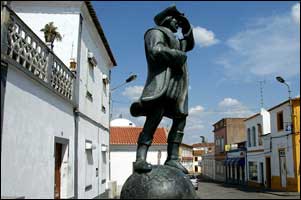 The village of Cuba, Portugal, birthplace of "Christopher Columbus." |
|
No authentic portrait of the man called Christopher Columbus exists. Even his many statues located throughout the world all have different faces. Most people like to see new faces but plastic surgery was not available back then.
|
Portugal, as well as Switzerland and Spain, were created by the "suppressed" Knights Templar.
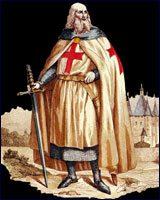 The Knights Templar uniform. |
|
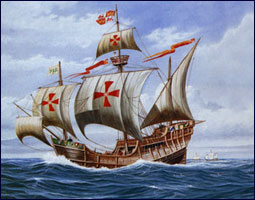 The Santa Maria adorned with the Templars red crosses. |
All the statues of Columbus are as phony as the so-called "Discoverer" himself.
|
In 1478, Salvador Fernandez Zarco married a daughter of Bartolomeu Perestrelo named Doña Felipa Perestrelo, and they lived on the island of Madeira.
|
The discoverers were actually blown by a storm from Portugal to the Madeiras so the two islands of Porto Santo and Madeira were claimed for Portugal. They began to colonize the two islands with people from Portugal.
5 Spanish sailors died in the house of Zarco/Columbus
In 1486, 5 shipwrecked Spanish sailors died in the house of Zarco/Columbus after returning from a voyage to the West Indies!!Up to this time, all we really know about Zarco/Columbus was that he was married and living on the island of Madeira. Here is a quote from the Royal Commentaries of the Incas by Garcilaso de la Vega, el Inca:
.And because of the delay they ran out of water and supplies. For this reason and because of the great privations they had suffered on both journeys, they began to sicken and die, and of seventeen men who left Spain, no more than five reached Terceira, among them the pilot Alonso Sanchez de Huelva. They stayed at the house of the famous Genoese Christopher Columbus, because they knew he was a great pilot and cosmographer and made seamen's charts. He received them kindly and entertained them lavishly so as to learn the things that had happened on the long and strange voyage they said they had undergone. But they arrived so enfeebled by hardships that Christopher Columbus could not restore them to health despite his attentions, and they all died in his house, leaving him the heir to the hardships that had caused their death. (Royal Commentaries of the Incas, vol. 1, pp. 12-14).
Miraculously, the Genoese wool-comber Columbus is now a pilot and navigator and living on the island of Madeira.
The Portuguese royal family were descended from the Plantagenets!!
Portugal as an independent nations was about to be annexed to Castile until the Plantagenets came to their rescue. Phillipa of Lancaster was the sister of John of Ghent who was supposed to succeed his father, King Edward III, as king of England. The Norman law of primogeniture, in which the firstborn son gets everything, prevented his assuming the crown.
|
|
|
With the dead pilot's maps and charts in his possession, Columbus went to King John II of Portugal and gave him a long list of demands as his price for "discovering" new islands. The king refused his offer and sent his own expedition using the dead pilot's maps and charts. The expedition turned back empty handed because Zarco, like Magellan, made some changes to the maps . . . just in case someone should steal his discovery!!
|
When they returned, Zarco/Columbus was furious and decided to get revenge by offering his services to Portugal's bitter rival, Spain.
Zarco/Columbus in Spain
In 1487, Columbus arrived in Spain and stayed at the Franciscan monastery of Santa María de la Rábida near Palos. He made several attempts to contact Ferdinand and Isabella with his great "discovery" but they were too busy fighting the Moors in Granada.
|
Zarco stayed at the Santa María de la Rábida monastery until Ferdinand and Isabella were ready to receive him in 1492.
Doubtless he shared his maps with the Franciscan monks.
Miraculously, the 700 year old war with the Moors ended in January 1492, and the Spanish army was suddenly unemployed.
After receiving minute details of the voyages of John Cabot, the Latin sovereigns decided to give Columbus all the titles and money that he demanded.
Columbus had the dead pilot's maps and the maps of John Cabot to guide him.
Using the maps of the dead pilot and Cabot to guide him; he sets sail on August 3, 1492, with 3 ships: the Niña, the Pinta and the Santa María. Martin Pinzón, captain of the Niña, was first to land on Santo Domingo!!
Zarco/Columbus knew EXACTLY where he was going!!
Like Magellan, Columbus knew exactly the route to take on his voyage of discovery!!
| |
For any voyage of "discovery", a map showing longitude and latitude takes the guesswork out of discovering new lands.
The Bull of Borgia was aimed at the Portuguese . . . and English!!
Without an understanding of the bitter rivalry between Spain and Portugal it is impossible to completely understand the Columbus saga. Just as Columbus was about to sail, the Spanish engineered a coup d'état at the Vatican and Spanish Pope Alexander VI was "elected" Pope. Here is an excerpt from the infamous Bull of Borgia giving the entire New World exclusively to Spain:
Furthermore, under penalty of excommunication late sententie to be incurred ipso facto, should anyone thus contravene, we strictly forbid all persons of whatsoever rank, even imperial and royal, or of whatsoever estate, degree, order, or condition, to dare, without your special permit or that of your aforesaid heirs and successors, to go for the purpose of trade or any other reason to the islands or mainlands, found and to be found, discovered and to be discovered, towards the west and south, by drawing and establishing a line from the Arctic pole to the Antarctic pole.... Let no one, therefore, infringe, or with rash boldness contravene, this our recommendation, exhortation, requisition, gift, grant, assignment, constitution, deputation, decree, mandate, prohibition, and will. Should anyone presume to attempt this, be it known to him that he will incur the wrath of Almighty God and of the blessed apostles Peter and Paul.
Given at Roma, at St. Peter's, in the year of the incarnation of our Lord one thousand four hundred and ninety-three, the fourth of May, and the first year of our pontificate. (Papal Bull granting the New World to Spain, May 4, 1493).
All the land south of the Pyrenees was called Spania in the New Testament and was evangelized by the Apostle Paul before his beheading at Rome.
Portugal did not exist before 1139
The first king of what we know today as Portugal was Alphonse I. More countries mean more wars so the Vatican created Portugal out of the chaos of the Visigothic, Viking, and Moorish invasions, and during the darkest hours of the Dark Ages.
|
The Portuguese were pioneers in the modern slave movement. They raided the coast of Africa and the Muslims supplied them with slaves from the interior.....These slaves were brought back to Portugal and then sold to the Europeans.
They were the first to obtain Papal approval of their conquests and piracy.
In 1455, Pope Nicholas V published a Bull entitled Romanus Pontifex in which he gave Portugal the exclusive right to conquer and enslave ALL non-Roman Catholics.
This Bull was the forerunner of the deadly Bull of Pope Alexander VI which gave exclusive right to Spain to conquer and enslave the New World natives.
Official Chronology of Salvador Fernandes Zarco a.k.a. Christopher Columbus!!
DATE |
EVENT |
About
1436 |
Portuguese
Salvador Fernandez Zarco a.k.a. Christopher Columbus is born in
Cuba, Portugal. |
1479
|
Zarco/Columbus
marries a Portuguese lady of royal birth named Doña Felipa
Perestrello. She is the daughter of one of the discoverers
of the 2 Madeira Islands. |
1486
|
After
surviving a horrific hurricane that blew their ship all the way
to the island of Santo Domingo in the New World, Alonso Sánchez
the pilot and 4 Spanish sailors are shipwrecked on the island
of Madeira . . . and they all die in the house of Columbus....He
steals the maps and charts showing the location of the
New World....Columbus approaches the king of Portugal in order
to finance his voyage of "discovery" but the king refuses
to meet his demands. Columbus's wife Doña Felipa also dies
mysteriously leaving him with a 5 year old son, Diego. |
1487
|
Columbus
arrives in Spain and he presents his great idea for the "discovery"
of new islands to King Ferdinand and Queen Isabella. They are
busy fighting the Moors and they also refuse to meet his demands. |
1492
|
After
receiving minute details of the voyages of John Cabot, the Latin
sovereigns decide to give Columbus all the titles and money that
he demanded....Using the dead pilot's maps to guide him, he sets
sail on August 3 with 3 ships: the Niña, the Pinta and
the Santa María. Martin Pinzón, captain of the Niña,
is first to land on Santo Domingo!! |
1493
|
In
March, only the Niña and the Pinta return to Spain because
Columbus wrecks his ship the Santa María. Before
going to Barcelona to meet the King and Queen, Martin Pinzón
invites Columbus to stay at his house . . . and he dies a few
days later....Pope Alexander VI–a Spanish Pope–issues
a Papal Bull (official Vatican document) giving the entire New
World to Spain and warning every other nation not to even think
about going there!! |
1498 |
On
his 3rd voyage, Columbus finally reaches the coast of Venezuela
and sees the New World mainland for the first time— 4 years
after John Cabot. By this time, the news of the shipwrecked Spanish
sailors is everywhere so Columbus decides to get revenge by killing
and enslaving the New World natives....The Spanish Inquisition
was also very anxious to occupy and set up forts on the
islands and mainland in order to attack any Portuguese or English
ships that appeared. |
1502 |
Columbus
leaves Spain on his 4th voyage to the New World. |
1504 |
He
arrives back in Spain a total failure after losing 2 ships.
|
1506 |
Columbus
dies of old age in Valladolid, Spain, on May 20, 1506.
No living portrait of Columbus exists. The only portrait that
is supposed to be close to his likeness is the one in the Biblioteca
Nacional, Madrid. |
Vital Links
Royal Commentaries of the Incas
Comentarios Reales De Los Incas
References
Barreto, Mascarenhas. The Portuguese Columbus: Secret Agent of King John II. (Translated from Portuguese by Reginald Brown), St. Martin's Press, New York, 1992.
Bown, Stephen R. 1494: How a Family Feud in Medieval Spain Divided the World in Half. St. Martin's Press, New York, 2012.
Catz, Rebecca. Christopher Columbus and the Portuguese, (1476-1498). Greenwood Press, Westport, CT., 1993.
Marques, António Henrique R. de Oliveira. History of Portugal. (in 2 volumes). Columbia University Press, New York, 1972.
Miller, Richard Roscoe, LL. B. Slavery and Catholicism. North State Publishers, Durham, North Carolina, 1957. (An EXCELLENT source of information on the Roman Catholic origin of Old World and New World slavery).
Irving, Washington. The Life and Voyages of Christopher Columbus. Belford Company Publishers, New York. 1836.
Taviani, Emilio Paolo. Christopher Columbus, The Grand Design. Orbis Publishing Ltd., London, 1985.
Vega, Garcilaso de la, El Inca. Royal Commentaries of the Incas. 2 volumes, University of Texas Press, 1966.
Copyright © 2015 by Patrick Scrivener
